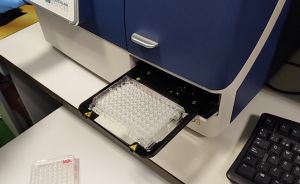Los grupos de los investigadores del CNB-CSIC Hugh Reyburn, Mar Valés-Gómez, José María Casasnovas y José Miguel Rodríguez Frade han conseguido identificar una nueva proteína que funciona como antígeno y combinarla con otros antígenos virales en un test serológico con una fiabilidad superior al 98%. “El desarrollo de ese test en tiempo record, debido al esfuerzo de mucha gente, demuestra los beneficios de una buena colaboración medica-científica.”
Dos tipos de diagnóstico: PCR y test serológicos
Los test de diagnóstico se han convertido en una tecnología fundamental para poder controlar la pandemia de Covid-19, siendo una demanda constante de los diversos sistemas sanitarios. Existen dos tipos fundamentales de pruebas de diagnóstico: las PCR, que permiten saber si un paciente está contagiado por el coronavirus en el momento de su realización, y los test serológicos, que detectan anticuerpos y determinan si un individuo ha sido infectado con el SARS-CoV-2, así como si su sistema inmunitario ha reaccionado frente al mismo.
Los test serológicos se realizan con muestras de sangre y detectan distintos tipos de anticuerpos (inmunoglobulinas): la IgM (inmunoglobulina M), la primera que se genera tras la infección, indica que el individuo está iniciando la respuesta a la enfermedad; la IgG (inmunoglobulina G), se produce en un momento más avanzado de la infección y puede perdurar en el tiempo, informando, hasta meses después, de que un individuo ha padecido la enfermedad; y la inmunoglobulina A (IgA), que se produce en estados tempranos, pero puede ser detectada también en fases tardías.
Las IgM aparecen aproximadamente 7 días después del inicio de la infección, junto a los síntomas de la Covid-19, y permanecen en el organismo alrededor de uno a dos meses. Las IgG aparecen aproximadamente a los 15 días del comienzo de los síntomas, y su permanencia en sangre suele ser mayor. Las IgA son inmunoglobulinas que se encuentra más localizadas en las superficies mucosas como la vía respiratoria, aunque se detectan también en el suero del paciente.
El problema fundamental de los test serológicos hasta la fecha es su baja fiabilidad, que se determina en función de dos parámetros: la sensibilidad y la especificidad del test. Una alta sensibilidad evita falsos negativos, mientras que una alta especificidad evita falsos positivos, que pueden surgir al detectar, por ejemplo, anticuerpos frente al virus de la gripe o a otro tipo de coronavirus diferente al SARS-CoV-2. En una carta publicada recientemente en el British Medical Journal (BMJ), expertos médicos alertaban de la baja fiabilidad de los test serológicos disponibles en Reino Unido para los empleados sanitarios y cuidadores.
Transferencia al tejido industrial
El trabajo posterior de la Dirección del CNB-CSIC y de la Vicepresidencia Adjunta de Transferencia del Conocimiento del CSIC ha permitido proteger esta tecnología mediante patente y Material Biológico, poniéndola a disposición del tejido industrial para que llegue a la sociedad cuanto antes. “Desde el inicio de la pandemia el CSIC, en coordinación con el Ministerio de Ciencia e Innovación, está desarrollando una estrategia que asegure que el conocimiento y las tecnologías relacionadas con el Covid-19 lleguen lo antes posible a la sociedad en condiciones razonables para su adquisición por parte de los sistemas de salud pública. El objetivo desde el principio ha sido salvar vidas”, señala Ángela Ribeiro, vicepresidenta adjunta de Transferencia del Conocimiento del CSIC. “Además, para nosotros también es fundamental que dichas tecnologías se transfieran a las empresas españolas, para evitar la dependencia de terceros países en un sector tan estratégico como el de la salud", añade la Dra. Ribeiro.
Además de los kits ELISA, esta tecnología puede producirse en el formato de tiras inmunocromatográficas, una técnica similar a la que se emplea en las pruebas de embarazo, que también se conocen como test rápidos de anticuerpos porque el resultado se genera en solo 15 minutos. El CSIC ya está tratando con varias empresas españolas la licencia de estos test en este formato.
Aunque la gran mayoría de las licencias que firma el CSIC para transferir los derechos de explotación de sus tecnologías a empresas se hacen en términos de exclusividad, “en este caso en particular la licencia es no-exclusiva, para permitir que otras empresas puedan también comercializar estos test, de forma que se cubra la demanda y que el precio sean económicos”, indica Javier Maira Vidal, jefe del Área de Estrategia Comercial e Internacionalización del CSIC.
Además, “se pretende que la tecnología llegue a todos los países que la necesiten, y ya estamos hablando con varios países de Latinoamérica, aunque al ser una tecnología desarrollada con fondos públicos, el compromiso de Immunostep es cubrir primero la demanda nacional”, añade Maira.






